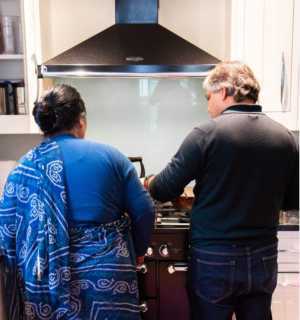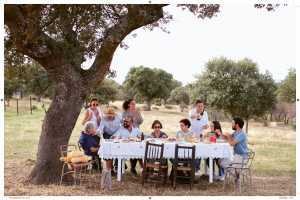“There’s an entire ecosystem around food – sometimes you’re cooking, sometimes eating, sometimes feeding,” says chef Vivek Singh. “When you would love to see someone and cook for them when they need it, but you can't? That is a completely different kind of pain.”
In early 2020, that ecosystem was dealt a crippling blow. Singh’s family was one of the millions around the world who were separated for extended periods of time after Covid began to shut down borders and lock down whole nations. As a result, he was unable to share a meal with his mother Urmila, who lives in India, for two years.
“We were apart from my family for 13 months, which I think was the longest time I've ever been without seeing my mum,” adds chef José Pizarro, whose 88-year-old mother Isabel lives in Spain. “My mum has always been and still is an amazing cook. For me, cooking has always been related to her, and related to things I learned from her.”

For Singh, this pain was eased in part by channelling his mother’s cooking. “As I've grown older, I realise how the foods that I reach out for when I am in need of comfort or familiarity are very often things she used to make for us when we were children.”
During the first lockdown, Singh found himself drawn to cooking khichdi, a hearty dish made with lentils and aubergines that was a staple among his mother’s repertoire, and enjoyed every weekend during his childhood.
“I remember, as a family recipe, it would get cooked every Saturday afternoon, week after week,” he says, recalling how he began to do the same for his wife and children. “We started recreating those rituals.”
For London-based cookery writer Georgina Hayden, food acted as an emotional lifeline for her Greek-Cypriot family. ‘My grandparents, who live down the road, had a restaurant for almost 30 years. They were the ones that inspired me to cook,’ she explains. ‘Just before the first lockdown, my grandfather was diagnosed with dementia. They usually spend half their time here and half in Cyprus, and so it was quite tricky for them.’
Cooking has always been related to my mum, and to things I learned from her
“We were doing lots of window-waves and chats standing on the doorstep, but the way that we were keeping in touch was basically through food,'' she says, recalling dropping off home-cooked dishes to their north London flat. Helping her grandmother to continue cooking during this time was also key in “keeping her sane”, says Hayden.
“Easter is such a big part of Greek culture. So for my gran, I remember she was adamant that she was still going to make these breads, flaounes, that we make. I remember everyone doing everything they could to try and get her some cheese and eggs – and obviously flour was in short supply. My friend, baker Juliet Sear, cycled an hour from Angel to Zone 4 to bring me yeast for them. It was really amazing.”
But while some families were separated, others found themselves unexpectedly locked down with multiple generations under one roof – which had both its benefits and drawbacks.
“The kitchen was our biggest source of contention because my mum loves to cook, and she's a real character,’ says pastry chef Ravneet Gill, who spent the lockdowns living with her mum, dad, brother and grandmother in east London, and whose chocolate chip cookie recipe – tutorials of which were filmed in their shared kitchen – proved a viral Instagram hit during that time. “My grandma loves to be in the kitchen. She's another big character. So I would say that most of our arguments came from the kitchen.’
Ellis Parrinder
“But then equally, we were taking turns to cook so it actually became really fun. My brother started cooking when previously he did not cook at all. I learned little bits from my grandma, and I learned recipes from my mum in that time… To be honest, it was a blessing in disguise. I loved it so much.”
“Because of Covid, it just made sense to move back with my parents for a bit,” explains chef Lee Westcott, formerly of Penson’s and Bethnal Green’s dearly departed Typing Room, who relocated from East London to his mum’s home in Hertfordshire when the contract for his flat came up in 2020. During those couple of months, Westcott found a new application for his skills – teaching his teenage brother and sister how to cook.
“They don't cook too much because I guess my mum does it a lot for them, but I was just like ‘Come on, this is a good opportunity for you to learn just some simple, basic, essential dishes’. Just like spaghetti bolognese, and making pasta sauce from scratch – simple stuff like that, and trying to get them to eat more vegetables.”
Westcott wasn’t the only one encouraging the younger members of his family into the kitchen. A study published in the Public Health Nutrition journal in May 2021 confirmed an increase in frequency of children cooking with their parents during the pandemic. This was boosted by a newfound work-from-home culture, and also corresponded to both children and parents having higher quality diets.
“The biggest difference for me, and I'm sure an entire generation of chefs like me, was that we have never had this amount of time with our families away from work, ever,” says Singh, who cooked much more with his two teenage children during that time. “I quite enjoyed that time – I don't know if the kids did too.”
“I normally make the breads with my grandma every year, it's our tradition,” says Hayden, in reference to her family’s determination to keep a cherished Easter custom alive during lockdown. “That was quite upsetting that we couldn’t, but I found another way of doing it with my two year old – a loaf version, which was much easier, much simpler.”
Fast forward two years, and Hayden is making plans to visit her grandmother’s (or yia yia’s) kitchen next week. “I still cook with my yia yia. I'm going on Monday night to prepare some dough. She's teaching me how to make these specific things called koupes. We still do this and she’s 82, it’s so nice.”
While Hayden cooked with her grandmother before the pandemic, she believes the struggles of Covid have fostered a new appreciation of family recipes, and food traditions being passed through the generations.
Most of our arguments happened in the kitchen. But cooking together was really fun
“I think as a whole, if you hadn't previously been the kind of person that thought much about your family recipes or history or intergenerational cooking, I think suddenly it did become much more important to people,” she says. “I don't mean this is a bleak way, but there was that sense of like, ‘I could lose anyone at any given time with this illness that is actually so quick’. I think that looming sense of everything being so frail and fragile, put pressure on people a bit and made them think, ‘Hold on, Granny might not be around forever, should I try and tap into this?’”
This renewed appreciation of intergenerational cooking is seemingly making its presence felt in the contemporary cookbook world. Next month, Darjeeling Express chef Asma Khan will release her second cookbook ‘Ammu’, dedicated to her mother, while José Pizarro’s upcoming book ‘The Spanish Home Kitchen: Simple Recipes and Memories from my Home’ focuses on his childhood memories of his own mother’s cooking.
“Recipes are, more than anything else, part of culture, part of history, and part of every single family,” says Pizarro. “I feel sorry when I see people that have lost their recipes, recipes that had continued from generation to generation. I think now we are more into preserving those things, that history, but I think a few years ago people didn't care much about that, they didn't feel that it was important enough.”

“I think lockdown definitely brought more people to the kitchen, and brought more people to thinking that being around the table with your family is something that is important – very, very important.”
For Gill, the enforced stillness of lockdown gave her time to properly connect with her mother’s recipes for the first time, some of which made it into her latest cookbook, Sugar I Love You.
“We've got her gulab jamun in there, which is an Indian pudding. It just takes so long to get that right, so actually, it was really good to have the time in the kitchen. We argued a lot, but we got there.”
I cook with my yia yia – she's still teaching me how to make koupes at 82
“We also had a proper samosa-making session, which was great because I love my mom's samosas, but she's never had time to properly teach me,” says Gill. “It was really nice because me, my mom and my grandma were all at the table, folding them and rolling them out.”
At the end of last year, Singh was able to reunite with his mother, and she’s currently staying with him at his family home in London – and sharing the same kitchen once again.
“The kids have their favourites of her cooking, and I have things that I really like, so I might say ‘Maybe we'll make this?’, and she'll somehow make it happen. She's not cooking as much, but I love cooking for her too.”
“The pandemic has driven home the point that when you're able to see people, share a plate of food, or cook for somebody, what a privilege it is. You just count your blessings.”
